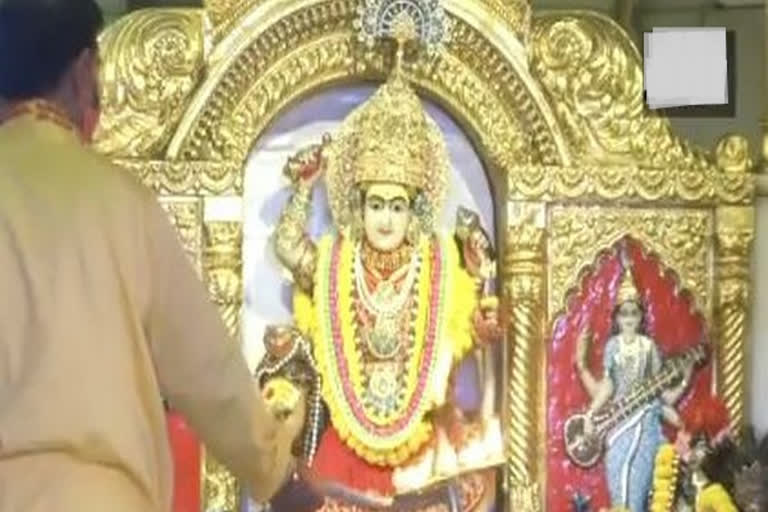New Delhi: A grand 'arti' was performed by priests at Delhi's Jhandewalan temple on the eighth day, which is known as Durga Ashtami, of Navratri on Saturday.
Durga Ashtami is considered to be one of the most important days of Navratri. It begins with Mahasnan and Shodashopachar Puja. On this day, all the nine forms of the goddess and young girls are worshipped on this day. This is known as Kumari puja.
Devotees are allowed to visit the Jhandewalan temple from 4 am to 12 pm.
The word Navratri translates to 'nine nights'. In most of the parts of India different forms of the goddess, Maa Durga, are worshipped during these nine nights-- Shilaputri, Brahmacharni, Chandraghanta, Kushmanda, Skandama, Katyayani, Kalratri, Maha Gauri, and Siddhidatri.
On the eighth day of Navratri, devotees across the country worship Goddess Mahagauri, the eighth avatar/form of Goddess Durga.
Meanwhile, morning 'arti' was also performed in Kalka Mandir where devotees attended the prayers following COVID-19 protocol.
Speaking to media, Karan Bhatia, media head of the Kalka temple said, "We have been following COVID-19 guidelines issued by the central government as there are different teams consisting of 25,00 males and 300 females working for different departments. We sanitise the temple premises twice a day. We also ensure that those who enter the temple wear a mask and use sanitiser."
"We have two ambulances ready for any emergency and we also have a team of qualified doctors if anyone needs medical treatment immediately," he added.
This year, COVID-19 pandemic has dampened the festivities as there is a huge decrease in the number of devotees arriving at the temple for offering prayers. Temple authorities are adhering to the COVID-19 guidelines issued by the Ministry of Home Affairs (MHA).
The festival is popularly and prominently celebrated in Gujarat, Maharashtra, West Bengal and the southern state of Karnataka.
In West Bengal, the last four days of Navratri is celebrated with much pomp and enthusiasm and is known as Durga Puja.
Also known as Sharad Navratri, the occasion is believed to mark Goddess Durga's victory over demon Mahishasura, signifying the victory of good over evil.
Jyoti Kalash, Kumari Puja, Sandhi Puja, Navami Homa, Lalitha Vrat and Chandi Path are other famous rituals and events which are observed during the nine days of Navratri. The 10th day of Sharad Navratri is celebrated as Dussehra or Vijaya Dashami.
ALSO READ: Delhi: People's health likely to be affected as AQI deteriorates to 'severe' category
(ANI)



